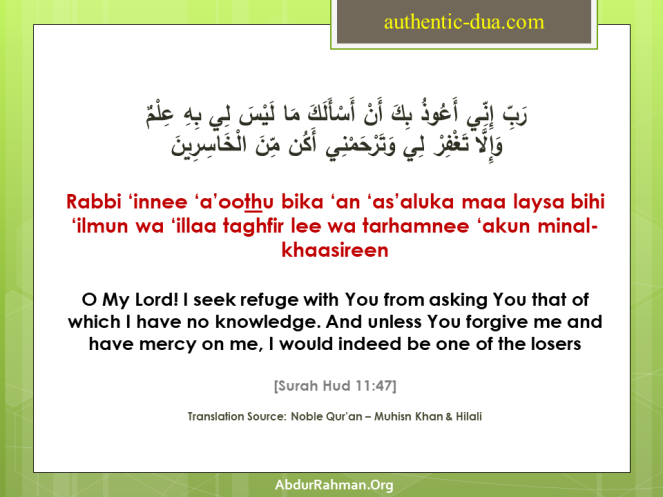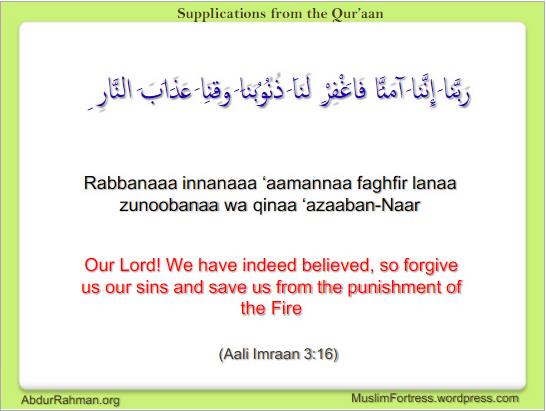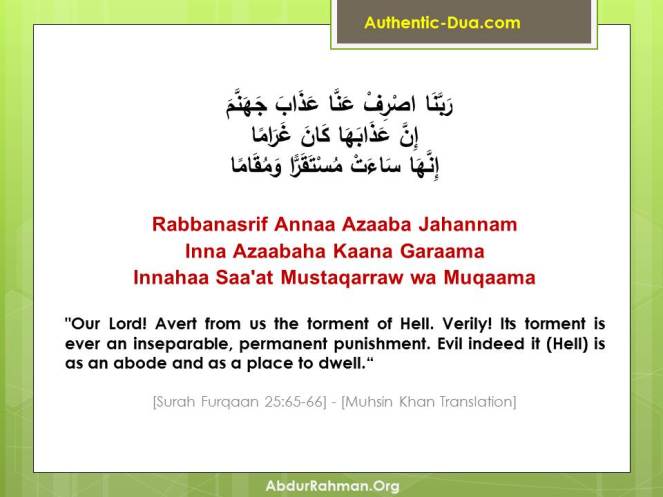Tafseer Ibn Kathir : Surah Al Baqarah Ayah 201
The Order for Remembrance of Allah and seeking Good in this Life and the Hereafter
(200. So when you have accomplished your Manasik, remember Allah as you remember your forefathers or with far more remembrance. But of mankind there are some who say: “Our Lord! Give us (Your bounties) in this world!” and for such there will be no portion in the Hereafter.) (201. And of them there are some who say: “Our Lord! Give us in this world that which is good and in the Hereafter that which is good, and save us from the torment of the Fire!”) (202. For them there will be alloted a share for what they have earned. And Allah is swift at reckoning.)
Allah commands that He be remembered after the rituals are performed.
(…as you remember your forefathers)
Sa`id bin Jubayr said that Ibn `Abbas said, “During the time of Jahiliyyah, people used to stand during the (Hajj) season, and one of them would say, `My father used to feed (the poor), help others (end their disputes, with his money), pay the Diyah (i.e., blood money),’ and so forth. The only Dhikr that they had was that they would remember the deeds of their fathers. Allah then revealed to Muhammad :
(Remember Allah as you remember your forefathers or with far more remembrance.)
Therefore, remembering Allah the Exalted and Ever High is always encouraged. We should mention that when Allah used “or” in the Ayah, He meant to encourage the people to remember Him more than they remember their forefathers, not that the word entails a doubt (as to which is larger or bigger). This statement is similar to the Ayat:
(…as stones or even worse in hardness) (2:74) and,
(. ..fear men as they fear Allah or even more) (4:77) and,
(And We sent him to a hundred thousand (people) or even more) (37:147) and,
(And was at a distance of two bows’ length or (even) nearer.) (53:9)
Allah encourages calling Him in supplication after remembering Him, because this will make it more likely that the supplication will be accepted. Allah also criticizes those who only supplicate to Him about the affairs of this life, while ignoring the affairs of the Hereafter. Allah said:
(But of mankind there are some who say: “Our Lord! Give us (Your bounties) in this world!” and for such there will be no portion in the Hereafter.) qmeaning, they have no share in the Hereafter. This criticism serves to discourage other people from imitating those mentioned.
Sa`id bin Jubayr said that Ibn `Abbas said, “Some bedouins used to come to the standing area (`Arafat) and supplicate saying, `O Allah! Make it a rainy year, a fertile year and a year of good child bearing.’ They would not mention any of the affairs of the Hereafter. Thus, Allah revealed about them:
(But of mankind there are some who say: “Our Lord! Give us (Your bounties) in this world!” and for such there will be no portion in the Hereafter.)
The believers who came after them used to say:
(Our Lord! Give us in this world that which is good and in the Hereafter that which is good, and save us from the torment of the Fire!”)
Next, Allah revealed:
(For them there will be alloted a share for what they have earned. And Allah is swift at reckoning.)
Hence, Allah praised those who ask for the affairs of both this life and the Hereafter. He said:
(And of them there are some who say: “Our Lord! Give us in this world that which is good and in the Hereafter that which is good, and save us from the torment of the Fire!”)
The supplication mentioned and praised in the Ayah includes all good aspects of this life and seeks refuge from all types of evil. The good of this life concerns every material request of well-being, spacious dwelling, pleasing mates, sufficient provision, beneficial knowledge, good profession or deeds, comfortable means of transportation and good praise, all of which the scholars of Tafsir have mentioned regarding this subject. All of these are but a part of the good that is sought in this life. As for the good of the Hereafter, the best of this includes acquiring Paradise, which also means acquiring safety from the greatest horror at the gathering place. It also refers to being questioned lightly and the other favors in the Hereafter.
As for acquiring safety from the Fire, it includes being directed to what leads to this good end in this world, such as avoiding the prohibitions, sins of all kinds and doubtful matters.
Al-Qasim bin `Abdur-Rahman said,
“Whoever is gifted with a grateful heart, a remembering tongue and a patient body, will have been endowed with a good deed in this life, a good deed in the Hereafter and saved from the torment of the Fire.”
This is why the Sunnah encourages reciting this Du`a’ (i.e., in the Ayah about gaining a good deed in this life and the Hereafter). Al-Bukhari reported that Anas bin Malik narrated that the Prophet used to say:
(O Allah, our Lord! Give us that which is good in this life, that which is good in the Hereafter and save us from the torment of the Fire.)
Imam Ahmad reported that Anas said,
“Allah’s Messenger visited a Muslim man who had become as weak as a sick small bird. Allah’s Messenger said to him, `Were you asking or supplicating to Allah about something’ He said, `Yes. I used to say: O Allah! Whatever punishment you saved for me in the Hereafter, give it to me in this life.’ Allah’s Messenger said:
((All praise is due to Allah! You cannot bear it -or stand it-. You should have said: (Our Lord! Give us in this world that which is good and in the Hereafter that which is good, and save us from the torment of the Fire!))
The man began reciting this Du`a and he was cured.” Muslim also recorded it.
Al-Hakim reported that Sa`id bin Jubayr said, “A man came to Ibn `Abbas and said, `I worked for some people and settled for a part of my compensation in return for their taking me to perform Hajj with them. Is this acceptable’ Ibn `Abbas said, `You are among those whom Allah described:
(For them there will be alloted a share for what they have earned. And Allah is swift at reckoning.)
Al-Hakim then commented; “This Hadith is authentic according to the criteria of the Two Shaykhs (Al-Bukhari and Muslim) although they did not record it.”
















You must be logged in to post a comment.